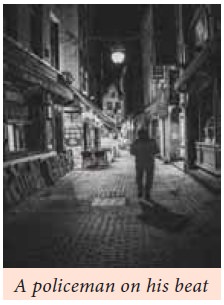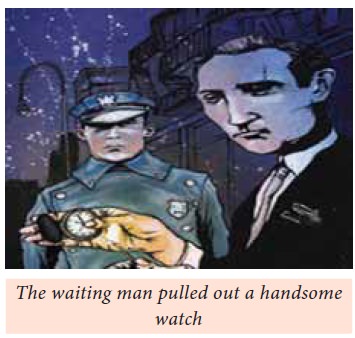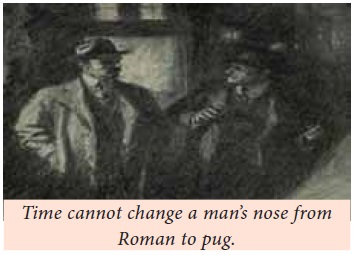Supplementary/Story by O. Henry - Supplementary: After Twenty Years | 11th English : UNIT 1 : Supplementary: After Twenty Years
Chapter: 11th English : UNIT 1 : Supplementary: After Twenty Years
Supplementary: After Twenty Years
Supplementary
After Twenty
Years
Here is a
story entitled ‘After Twenty Years’ which is about two best friends who had to
part ways. They return to keep an appointment they had made twenty years ago.
Read to find out what happens when they meet again.
The policeman on
the beat moved up the avenue impressively. Theimpressiveness was habitual and not for show, for spectators
were few. The time was barely 10 o’ clock at night, but chilly gustes of wind
with a taste of rain them had well nigh deepeopled the streets.
Trying doors as he
went, twirling his club with many intricate and artful m ov e m e nts ,turning Now and Then to cast his
w a t c h f u l eye adown the pacific thoroughfare,the officer,with his
stalwart form and slight swagger, made a fine picture of a guardian
of the peace. The vicinity was one that kept early hours. Now
and then you might see the lights of a cigar store or of an all night lunch
counter; but the majority of the doors belonged to business places that had
long since been closed.

When about midway
of a certain block the policeman suddenly slowed his walk. In the doorway of a
darkened hardware store a man leaned, with an unlighted cigar in his mouth. As
the policeman walked up to him the man spoke up quickly.
“It’s all right,
officer,” he said, reassuringly. “I’m just waiting for a friend. It’s an appointment made twenty years ago. Sounds a little
funny to you, doesn’t it? Well, I’ll explain if you’d like to make certain it’s
all straight. About that long ago there used to be a restaurant where this
store stands—Big Joe’ Brady’s restaurant.”
“Until five years ago,”
said the policeman. “It was torn down then.”
The man in the
doorway struck a match and lit his cigar. The light showed a pale, square-jawed
face with keen eyes, and a little white scar near his right eyebrow. His scarf
pin was a large diamond, oddly set.
“Twenty years ago
tonight,” said the man, “I dined here at Big Joe Brady’s with Jimmy Wells, my
best chum, and the finest chap in the world. He and I were raised here in New
York, just like two brothers, together. I was eighteen and Jimmy was twenty.
The next morning I was to start for the West to make my fortune. You couldn’t
have dragged Jimmy out of New York; he thought it was the only place on earth.
Well, we agreed that night that we would meet here again exactly twenty years
from that date and time, no matter what our conditions might be or from what
distance we might have to come. We figured that in twenty years each of us
ought to have our destiny worked out and our fortunes made, whatever they were
going to be.”
“It sounds pretty
interesting,” said the policeman. “Rather a long time between meets, though, it
seems to me. Haven’t you heard from your friend since you left?”
“Well, yes, for a
time we corresponded,” said the other. “But after a year or two we lost track
of each other. You see, the West is a pretty big proposition, and I kept hustling around over it pretty lively. But I know
Jimmy will meet me here if he’s alive, for he always was the truest, staunchest
old chap in the world. He’ll never forget. I came a thousand miles to stand in this
door tonight, and it’s worth it if my old partner turns up.”
The waiting man
pulled out a handsome watch, the lids of it set with small diamonds.
“Three minutes to
ten,” he announced. “It was exactly ten o’clock when we parted here at the
restaurant door.”
“Did pretty well
out West, didn’t you?” asked the policeman.
“You bet! I hope
Jimmy has done half as well. He was a kind of plodder, though,

I’ve had to compete with some of the sharpest wits going to get my pile. A man gets in a groove in New York. It takes the West to put a razor-edge on him.”
The policeman
twirled his club and took a step or two.
“I’ll be on my way.
Hope your friend comes around all right. Going to call time on him sharp?”
“I should say not!”
said the other. “I’ll give him half an hour at least. If Jimmy is alive on
earth he’ll be here by that time. So long, officer.”
“Good-night, sir,”
said the policeman, passing on along his beat, trying doors as he went.
There was now a
fine, cold drizzle falling, and the wind had risen from its uncertain puffs
into a steady blow. The few foot passengers astir in that quarter hurried dismally and silently along with coat collars
turned high and pocketed hands. And in the door of the hardwarestore the man
who had come a thousand miles to fill an appointment, uncertain almost to absurdity, with the friend of his youth,
smoked his cigar and waited.
About twenty
minutes he waited, and then a tall man in a long overcoat, with collar turned
up to his ears, hurried across from the opposite side of the street. He went
directly to the waiting man.
“Is that you, Bob?”
he asked, doubtfully.
“Is that you, Jimmy
Wells?” cried the man in the door.
“Bless my heart!”
exclaimed the new arrival, grasping both the other’s hands with his own. “It’s
Bob, sure as fate. I was certain I’d find you here if you were still in
existence. Well, well, well! Twenty years is a long time. The old restaurant’s
gone, Bob; I wish it had lasted, so we could have had another dinner there. How
has the West treated you, old man?”
“Bully; it has
given me everything I asked it for. You’ve changed lots, Jimmy. I never thought
you were so tall by two or three inches.”
“Oh, I grew a bit
after I was twenty.” “Doing well in New York, Jimmy?”
“Moderately. I have
a position in one of the city departments. Come on, Bob; we’ll go around to a
place I know of, and have a good long talk about old times.”
The two men started
up the street, arm in arm. The man from the West, his egotism enlarged by success, was beginning
to outline the history of his career. The
other, submerged in his overcoat, listened with interest.
At the corner stood
a drug store, brilliant with electric lights. When they came into this glare
each of them turned simultaneously to gaze upon the other’s face. The man from
the West stopped sud-denly and released his arm.

“You’re not Jimmy
Wells,” he snapped. “Twenty years is a long time, but not long enough to change
a man’s nose from a Roman to a pug.”
“It sometimes changes
a good man into a bad one”, said the tall man. “You’ve been under arrest for
ten minutes, ‘Silky’ Bob. Chicago thinks you may have dropped over our way and wires us she wants to have a chat with you. Going quietly, are
you? That’s sensible. Now, before we go on to the station here’s a note I was
asked to hand you. You may read it here at the window. It’s from Patrolman
Wells.”
The man from the
West unfolded the little piece of paper handed to him. His hand was steady when
he began to read, but it trembled a little by the time he had finished. The
note was rather short.
“Bob, I was at the
appointed place on time. When you struck the match to light your cigar I saw it
was the face of the man wanted in Chicago. Somehow I couldn’t do it myself, so
I went around and got a plainclothes man to do the job.”
- JIMMY
About the Author
O. Henry ( 1862 –
1910 ) is a popular American short- story writer whose original name is William
Sydney Porter.
His works
romanticized the life of ordinary people in New York City. His stories are
well-known throughout the world. They expressed the effect of coincidence on
character and often had unexpected twists in the end. His stories are also
noted for their witticism and clever wordplay. O. Henry’s prolific writing
period began in 1902 in New York City, where he wrote 381 short stories. He
wrote one story a week for The New York World Sunday Magazine for over a year.
O. Henry’s short
story ‘After Twenty Years’ was first published in the Sunday edition of the New
York World in 1905. The story was included in the 1906 anthology The Four
Million, and it has since been re-published in many short story collections.
A few of his other
popular short stories are The Gift of the Magi, The Cop and the Anthem, The
Ransom of Red Chief, A Retrieved Reformation and The Third Ingredient.
Related Topics